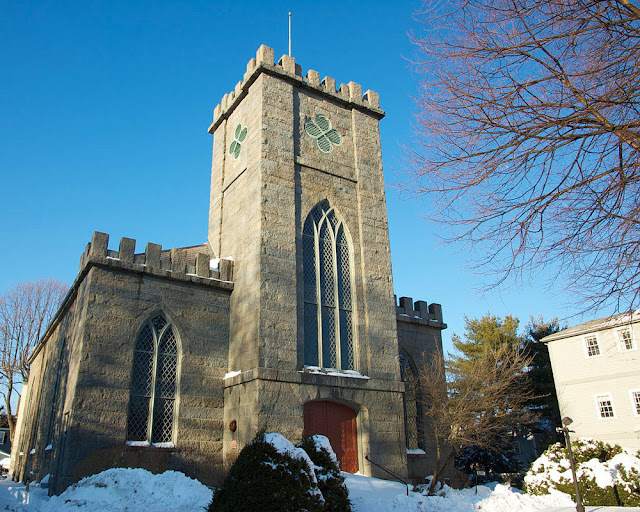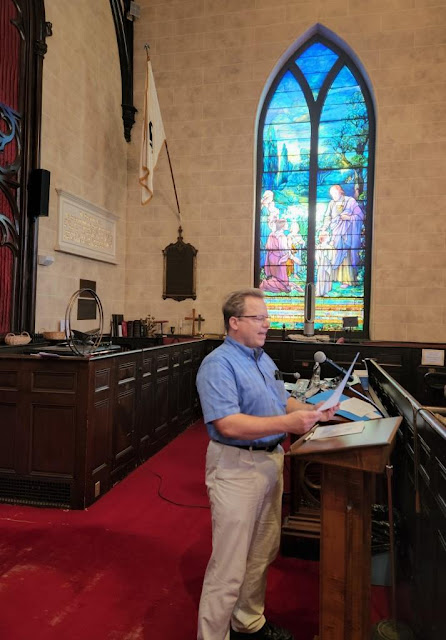
Image credit: www.firstchurchinsalem.org
This was the Sermon written and presented to those gathered for the Founders’ Day Service at the First Church in Salem on 7 August 2022 by Diane Smith, Chair, Archives Committee:
Founders Day is a very special day. The coming together of this church is a significant moment in the history of this country, but equally important is what our founders accomplished for us. Here we are today, you and me, together to play our part in the continuation of what people like Roger Conant, Captain Trask, Thomas Gardner and others began 393 years ago.
Today, we’ll focus on just a few things. For example, one of our members, one who took his lovely bride in marriage right here in this church, just published a history focused on our Founders, we had visitors from Tennessee who trace their family tree back to one of our Founding Pastors, a film crew from California spent some time here in our meetinghouse reflecting on the role of The First Church the witchcraft trials, and finally, for today at least, there is the group in England that loves to get together to talk about the character and integrity of one of our most prominent founders Roger Conant.
It’s hot, we all want to get out of here, so let me start with a quote. I have all these little scraps of paper all over my desk, hey, let’s be honest, all over my house and car. It can get a little messy sometimes. Like history can get a little messy sometimes. But a willingness to accept the imperfect with the perfect comes with the territory. To talk about our past, I will talk about our present.
On one of these scraps, I had a note to myself to remember the unicorn. It came from an article written by a History PhD candidate at William & Mary. She was digging through newspaper articles at the American Antiquarian Society in Worcester. You know the place. It holds the diaries of our very own Reverend Bentley among many other critical materials that document Salem’s place in American History.
She was captivated by the old stories of the Gloucester Sea Serpent in the early 1800s. Early suspicions about the creature was that it was a water bound unicorn. If you don’t know the story, take a ride up to the Cape Ann Museum where you’ll see a 9-foot-tall sculpture of the legendary creature. They really know how to tell a story up there.
I mention it here because, on Founders Day we look back at our own history and we are reminded of the fact that often, Past is Present. And as I waded through my notes, which often include some gems that I came across while doing something else, I found a quote from this soon to be historian as she reflected on the Salem Gazette Sea Serpent article. She warned about the perils of reading into what we see and hear more than we should sometimes.
Ms. Gruntner said, “If incredulity is the enemy of observation, then perhaps all we who study the past have a lesson to learn from the unicorn’s plight. “Wanting to believe” might in fact be the best way to enter both a unicorn’s forest and an archive. With this mentality, we can take our finds, hooved or otherwise, on their own terms.”
And she’s right. And it’s why, even as a professional who has been in the education and information business for more decades than I want to count, I leave the history to the historians. We are very fortunate in this congregation to have more than a few. For example, this is a good place to mention that our own Benjamin Shallop has recently released his book, The Founding of 2 Salem: City of Peace. Ben focuses his book on the beginning moments, some of which we are here to celebrate today. The overview of book says, “Out of the disease, greed, and chaos of the era would emerge one of the most unique cities in the world. Learn how a working-class salter named Roger Conant became the first governor of Massachusetts and why Miles Standish tried to end this new colony of fishermen with brute force.” Ben and many others in our church community are here to help us keep our facts and details straight. They are always eager to help us understand better who we are by looking through the lens of yesterday.
But for today, we are here to gently glance at our ancestors, hold them in our hearts, and reflect on who they were and how they were as people. Like us they were living, breathing beings walking these streets and doing their best to be people together. Like us, they weren’t perfect and like us they had their days and moments that were admirable and amazing and others that were, as the kids say, not so much. We do our best to carry on their efforts to move from tolerance of each other to acceptance, and to embrace those who might feel like outsiders anywhere else but in Salem, and especially never outsiders in The First Church in Salem.
We have a modest Archives here which serves as a bridge to some pretty wonderful things. I think about how Sméagol became Gollum in Tolkien’s Lord of the Rings. Making something too precious and holding onto it too tightly is rarely a good idea. Our Archives are safe and protected but controlled access to our humble collection, it turns out, is an amazing relationship building tool.
I saw this for myself recently in ways that pulled me outside of the Archives and into the light of relationship with people. Many of you were here in June when Wayne and Michael traveled from Tennessee to our doors to learn more about their ancestor Reverend Samuel Skelton. They were amazed at the stories we were eager to share about a man who went back 13 generations for them, but they were even more moved by the people they met here at the Sunday service they attended. Today Wayne and Michael are members of the Church of Latter-Day Saints without much knowledge about how they made their way there from the Puritan roots of Reverend Skelton. They were interested and eager to hear about our identity today as a Unitarian Universalist Church with its Gay Pride flag prominently waving and the principles of our liberal religion characterized by a "free and responsible search for truth and meaning". These were interesting and enlightening conversations that brought me to a place where I could feel the history of us, not just know it.
Another Archives people moment came with the arrival of a film crew working with an eighth grade class in Andover to raise awareness about Elizabeth Johnson Jr., a woman convicted of being a witch in 1692. Somehow her case fell through the cracks after the witchcraft hysteria was over and she was never exonerated. Maybe you saw the story on CNN yesterday “The last Salem Witch Exonerated” or read about it in the New York Times last week. The First Church in Salem plays a part in the documentary that was shot here earlier this summer. While looking at our Records Book entries from 1692 and 1712 for the excommunication and reinstatement of 1st Church members Rebecca Nurse and Giles Corey, we discussed if such a thing could happen again today. For me, it was a demonstration of how we live alongside our history, not in front of it.
I’ll end our moments together today by mentioning another way our Archives Committee helps to bridge our ancestors to the present moment. There is a group in Budleigh England who thinks Roger Conant, one of our most prominent founders, is as big a deal as we know he is. There’s information in this week’s Order of Service that provides a little more detail, so I don’t keep us here in the heat of August. I wanted to end on a mention of this budding relationship because all of you and other members and friends who can’t be here today, but carry us in their hearts, are the way and the reason for these relationships.
The All Saints Church is located in the Vicarage of the Raleigh Mission Community, in England. East Budleigh is the birthplace of both Roger Conant and Sir Walter Raleigh. In their conversations with me, they apologize for Raleigh’s role in bringing tobacco to the colonies. Given the rate of nicotine addiction and cancer, they are careful how they present this aspect of their history. But when it comes to Roger Conant, there are no such apologies. They see him, as do we, as a person ready to work hard, co-exist with others, and who came from a place of ethics and integrity to find peaceful solutions and live with a sense of commitment to the future.
Today, on this our Founders Day, we look to Roger Conant as one of many very human figures who helped to bring us to this place today. Our Founders are not imaginary unicorns remembered as being more than they were. The transcription of our Records Book from 1629 is easily revisited through the Internet Archives website in its entirety. Along with Ben Shallop’s book, primary source documents held by the most prestigious organizations in the state and nation, and our own materials there are plenty of opportunities to remember these ancestors all year long.
Yes, today is a very special day. Thank you for being here and thank you for your eagerness and commitment to keep this church going today, into its 400th anniversary and beyond.
www.firstchurchinsalem.org/archives







